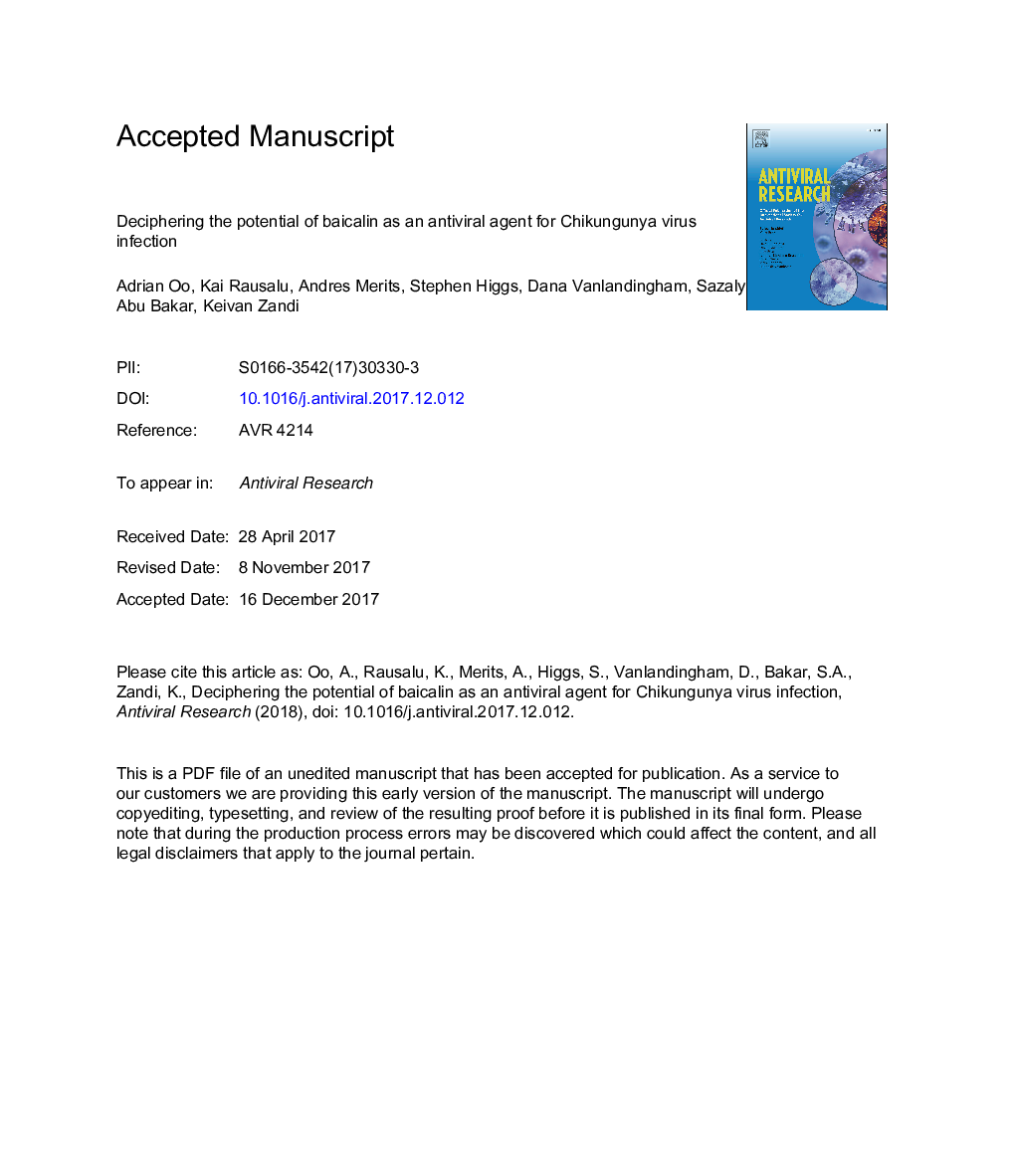| کد مقاله | کد نشریه | سال انتشار | مقاله انگلیسی | نسخه تمام متن |
|---|---|---|---|---|
| 8523353 | 1557793 | 2018 | 37 صفحه PDF | دانلود رایگان |
عنوان انگلیسی مقاله ISI
Deciphering the potential of baicalin as an antiviral agent for Chikungunya virus infection
دانلود مقاله + سفارش ترجمه
دانلود مقاله ISI انگلیسی
رایگان برای ایرانیان
موضوعات مرتبط
علوم زیستی و بیوفناوری
ایمنی شناسی و میکروب شناسی
ویروس شناسی
پیش نمایش صفحه اول مقاله

چکیده انگلیسی
The past decade has seen the re-emergence of Chikungunya virus (CHIKV) as a major global health threat, affecting millions around the world. Although fatal infections are rare among infected patients, the occurrence of long-lasting polyarthralgia has a significant impact on patients' quality of lives and ability to work. These issues were the stimuli for this study to determine the potential of baicalin, a bioflavonoid, as the novel antiviral compound against CHIKV. It was found that baicalin was well tolerated by Vero, BHK-21 and HEK 293T cells with maximal nontoxic doses >600 μM, â 350 μM and â110 μM, respectively. Antiviral assays indicated that baicalin was the most effective inhibitor when tested for its direct virucidal activity with EC50 â 7 μM, followed by inhibition of virus entry into the host cell, attachment of virus particle to cellular receptors and finally intracellular replication of viral RNA genome. In silico analysis using molecular docking demonstrated close interactions between baicalin and CHIKV envelope protein with considerably strong binding affinity of â9.7 kcal/mol. qRT-PCR analysis revealed that baicalin had the greatest effect on the synthesis of viral negative stand RNA with EC50 â 0.4 μM followed by the inhibition of synthesis of positive-strand genomic (EC50 â 13 μM) and subgenomic RNAs (EC50 â 14 μM). These readings indicate that the compound efficiently inhibits replicase complexes formation but is a less potent inhibitor of existing replicase complexes. Coherent with this hypothesis, the use of recombinant CHIKV replicons harboring Renilla luciferase marker showed that replication of corresponding replicon RNAs was only slightly downregulated at higher doses of baicalin, with EC50 > 100 μM. Immunofluorescence and western blotting experiments demonstrated dose-dependent inhibition of expression of different viral proteins. It was also observed that levels of important protein markers for cellular autophagy (LC3) and apoptosis (Bax) were reduced in baicalin treatment groups as compared with untreated virus infected controls. In summary, given its low toxicity and high efficacy against CHIKV, baicalin has great potential to be developed as the novel antiviral compound for CHIKV. In vivo studies to evaluate its activity in a more complexed system represent a necessary step for future analysis.
ناشر
Database: Elsevier - ScienceDirect (ساینس دایرکت)
Journal: Antiviral Research - Volume 150, February 2018, Pages 101-111
Journal: Antiviral Research - Volume 150, February 2018, Pages 101-111
نویسندگان
Adrian Oo, Kai Rausalu, Andres Merits, Stephen Higgs, Dana Vanlandingham, Sazaly Abu Bakar, Keivan Zandi,